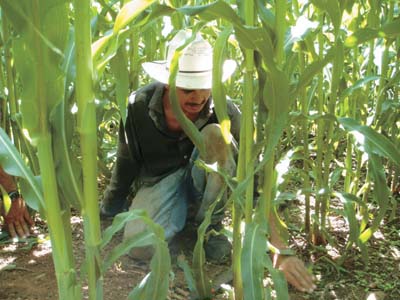 |
 |
| current issue |  |
past issues |  |
send a letter/news |  |
address update |  |
advertise |  |
about us |  |
alumni home |
Features
Building a Sustainable Life
 Students harvested vegetables grown by a UNH organic gardening club last fall. The produce was delivered to UNH dining halls.
Students harvested vegetables grown by a UNH organic gardening club last fall. The produce was delivered to UNH dining halls.
|
Last fall, children at 200 schools across New Hampshire crunched their way through 119,000 apples—fresh-off-the-tree Macintosh and Empires locally grown at area orchards. They were also drinking fresh cider—lots of it. "It's been an eye-opener for us," says Linda Dodds, director of food service for Newmarket schools. "The kids love it. We go through 10 cases of cider a week."
That's exactly what UNH's Office of Sustainability Programs is after—eye-opening experiences that change habits, change the way people think, and ultimately make tangible the concept of sustainability—a world in which the needs of the current population are met without compromising the ability of future generations to meet their own needs. "The kids learn about buying locally, about the effect on the environment, the economy, open space and all the rest of it," says Nathan Duclos '03G, assistant director of the Farm-to-School program, which is designed to connect schools and local farmers.
One of a number of OSP initiatives, the program has grown rapidly since it began in 2003, expanding from 70 participating schools last year to 200 this year. The hope is to add the rest of the state's schools as well as additional farmers, who will benefit from new outlets for their products.
One of a number of OSP initiatives, the program has grown rapidly since it began in 2003, expanding from 70 participating schools last year to 200 this year. The hope is to add the rest of the state's schools as well as additional farmers, who will benefit from new outlets for their products.
Kelly came to UNH seven years ago, when the university established an endowed sustainability program—the only one of its kind in the world. Already, he notes, UNH is a recognized leader in the field, winning national awards for energy efficiency and transportation improvements. Often working behind the scenes, OSP aims to promote learning and change that have an impact on community life.
 Ramon Salguero checks corn grown in his field with organic compost.
Ramon Salguero checks corn grown in his field with organic compost.
|
Take compost, for example. Each morning since 1998, student interns have been making the rounds to campus dining halls, gathering more than 300,000 pounds of food waste over the years that would otherwise have wound up in a landfill. Instead, it winds up at Kingman Farm, and when it's ready, the compost is sold, finding its way back to local gardens and farms.
And then there's the lettuce—700 heads grown last year on the first certified organic plot of land on campus. When the season was over, members of the organic gardening club delivered the results of their labor directly to campus dining halls. Coordinated in part by the Office of Sustainability, the project adds one more piece to the UNH sustainability puzzle.
Other pieces get put together in the classroom, as sustainability is integrated into a host of courses. A new graduate curriculum in public health ecology, for example, includes a course co-taught by Kelly and climate researcher Cameron Wake '93G.
OSP's system for measuring greenhouse gas emissions has become a benchmark in the effort to reduce overall emissions on campus, which were measured at 60,300 metric tons of carbon dioxide between 1999-2003. UNH's new co-generation plant, scheduled for this fall, will reduce emissions by 40 percent.
Steve Pesci '87, '92G, transportation planner in the Office of Campus Planning, credits the emissions measurements with helping the university secure millions of dollars in federal funding. "It documents our progress," says Pesci. "Most places can't do that." Last year, for example, $350,000 in federal funding replaced six of UNH's diesel buses—nearly a quarter of the fleet—with vehicles that run on compressed natural gas. Another six buses are slated to be replaced this year.
From emissions reductions to curriculum changes to food supply innovations, the pieces of UNH's sustainability puzzle are gradually coming together. Kelly points to alumni as the ultimate measure of success: "Do they understand how to advance sustainability in their civic and professional lives? That's the real question," he says. Only when people think differently will change become real, as tangible as the crunch of a fresh, locally grown apple eaten by a schoolchild who can tell you where the apple came from—and why it matters.

